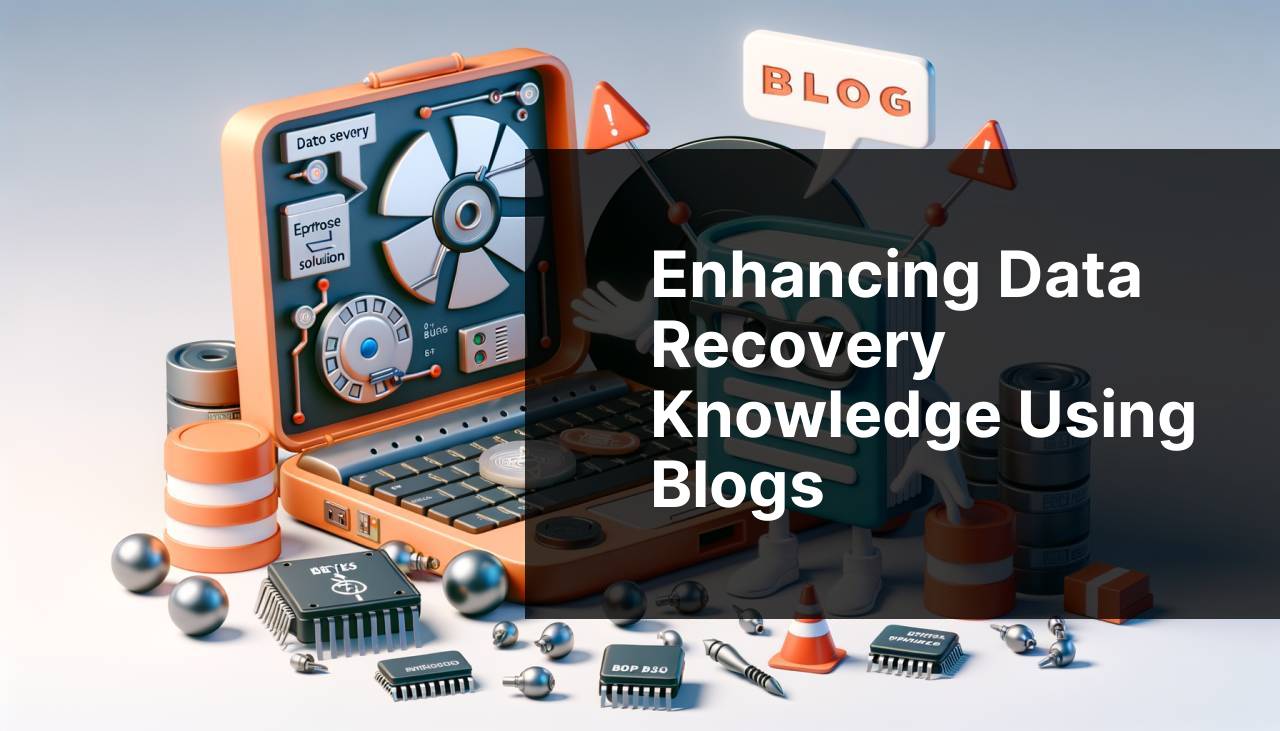Enhancing Data Recovery Knowledge Using Blogs

In today’s digital era, data recovery is becoming increasingly crucial. As our reliance on electronic data grows, the need for efficient data recovery solutions becomes evident. Numerous resources are available online for those seeking to enhance their knowledge about data recovery. One effective way is to use blogs. Blogs can provide detailed insights, tips, techniques, and updates about the latest in data recovery, often sharing firsthand experiences and case studies. Let’s explore various ways to use blogs to enhance your data recovery knowledge and where to find this valuable information.
Common Scenarios:
Hard Drive Failure 😫
- Experiencing a hard drive failure can be daunting, especially if it contains vital data.
- Knowledge about data recovery methods from blogs can be extremely helpful in such scenarios.
- Understanding the steps required to recover data from a failed hard drive.
- Learning best practices to prevent future data loss.
Accidental Deletion 😓
- Accidentally deleting important files happens to the best of us.
- Blogs often discuss methods for recovering accidentally deleted files.
- Guidance on using file recovery software.
- Advice on avoiding further file loss during recovery efforts.
Corrupt Data 😥
- Data can become corrupt due to various reasons, such as software bugs or hardware issues.
- Finding accurate information on handling corrupt data is crucial.
- Blogs share insights into the necessary precautions to avoid further data corruption.
- Recommendations on effective data recovery tools can also be found in blogs.
Step-by-Step Guide. How To Use Blogs To Enhance Your Data Recovery Knowledge:
Method 1: Follow Industry Blogs 📖
- Identify reputable industry blogs that focus on data recovery.
- Regularly visit blogs like read the latest from Handy Recovery Advisor on Medium. The Medium page that is dedicated to Handy Recovery Advisor. It features articles related to data recovery, offering insights, tips, and guides.
- Bookmark and subscribe to email updates to stay informed about new posts.
- Engage with content by sharing and commenting your experiences or queries.
Note: Ensure the blogs you follow are regularly updated and include credible, well-researched articles.
Conclusion: Industry blogs can be a treasure trove of information, offering both basic and advanced data recovery tips.
Method 2: Use Blog Aggregators 🌐
- Utilize blog aggregators to discover popular content on data recovery.
- Access platforms like Feedly to compile and categorize relevant blog posts.
- Follow tags and topics related to data recovery on these platforms.
- Create a dedicated feed to streamline your research.
Note: Aggregators help you keep up with multiple sources of information without the need to visit each site individually.
Conclusion: Blog aggregators are excellent tools for consolidating useful content and staying updated with the latest in data recovery.
Method 3: Social Media for Blogs 📱
- Follow data recovery experts and influencers on social media platforms like Twitter and LinkedIn.
- Join relevant groups and communities dedicated to data recovery.
- Keep an eye on blog links shared by these experts and engage with the content.
- Participate in discussions to broaden your knowledge and network with professionals.
Note: Social media is an excellent way to discover real-time information and connect with industry experts.
Conclusion: Leveraging social media enhances your learning experience by connecting you with a global community of data recovery enthusiasts and professionals.
Method 4: Educational Websites and Blogs 🧑
- Seek out educational websites and blogs offering comprehensive guides about data recovery.
- Refer to sites like How-To Geek for step-by-step tutorials.
- Read whitepapers and case studies for in-depth knowledge.
- Subscribe to newsletters for regular updates.
Note: Ensure the educational resources you use are authentic and offer accurate information.
Conclusion: Educational blogs and websites offer a structured approach to learning about data recovery, making complex topics more understandable.
Method 5: Forum and Community Blogs 💬
- Join forums and communities that focus on data recovery.
- Engage in discussions and seek advice from experienced members.
- Share your challenges and learn from shared experiences of others.
- Refer to forum threads and blog posts for practical solutions.
Note: Communities such as TechRepublic offer rich insights and peer support.
Conclusion: Community blogs and forums are valuable resources for practical tips and collective knowledge.
Precautions and Tips:
Stay Safe While Diving into Data Recovery Blogs 🚧
- Always verify the credibility of the information before implementation.
- Avoid untrusted software downloads and stick to recommendations from reputable sources.
- Have a backup solution in place to prevent data loss during your experiments.
- Keep your systems updated to avoid vulnerabilities that could affect data safety.
Additional Insights
To gain a deeper understanding of data recovery, it’s beneficial to explore a variety of online resources and tools. One of the resources to consider is Reddit. The platform has a dedicated community where users share their data recovery experiences and provide tips. Engaging in these conversations can provide real-world insight that is often missing from more generalized sources.
Another valuable resource is Lifehacker. Known for its DIY approach to tech problems, Lifehacker frequently publishes articles on data recovery tools and techniques. These posts are usually accompanied by step-by-step guides, making it easier for even the less tech-savvy to follow along.
For those who prefer a more visual learning experience, YouTube offers numerous channels and videos dedicated to data recovery. Channels like ‘Techquickie’ cover technical topics in a straightforward manner. YouTube allows you to see the actual process of data recovery, which can be particularly helpful for complicated tasks.
It’s also important to stay updated on the latest software and tools used in data recovery. Websites like CNET provide reviews and comparisons of the latest software, giving you a better idea of what might work best for your specific needs.
Do not overlook expert opinions and reviews. Websites like Tom’s Hardware often feature in-depth reviews and articles written by industry experts. These reviews can help you choose the right tools and techniques, especially when dealing with advanced data recovery tasks.
Another significant aspect is the legal side of data recovery. Websites such as ZDNet occasionally focus on the data protection laws and what is permissible within your region. Understanding these laws can save you from potential legal troubles down the line.
Conclusion:
FAQ
How can blogs help enhance my data recovery knowledge?
Blogs provide updated information, expert insights, and practical tips, making them a valuable resource for both beginners and professionals looking to enhance their data recovery knowledge.
What types of blogs should I read for data recovery tips?
Focus on blogs that cover data recovery software, hardware failures, expert advice, and case studies to get a well-rounded understanding of various recovery scenarios.
Where can I find reputable data recovery blogs?
How often should I check data recovery blogs for updates?
Regularly checking blogs weekly or monthly helps you stay informed about the latest trends, tools, and techniques in the data recovery field.
Can I trust the information on data recovery blogs?
While many blogs provide reliable information, it's crucial to cross-reference with reputable sources or educational institutions to verify the facts.
What additional resources do data recovery blogs provide?
Many blogs offer downloadable tools, video tutorials, webinars, and eBooks that go in-depth into various aspects of data recovery processes.
How can blog comment sections enhance my learning?
Engaging in blog comment sections allows you to discuss topics with experts, ask questions, and learn from others' experiences and insights.
Are tutorial blogs helpful for learning practical data recovery skills?
Absolutely, tutorial blogs provide step-by-step instructions and real-world examples, making it easier to understand and apply data recovery techniques effectively.
How do case studies in blogs benefit my data recovery knowledge?
Case studies showcase real-life data recovery scenarios, detailing the challenges and solutions implemented, offering practical insights into different recovery situations.
Can subscribing to a blog newsletter improve my data recovery skills?
Subscribing keeps you regularly updated with new posts, tools, and techniques, ensuring continuous learning and skill enhancement in data recovery.
